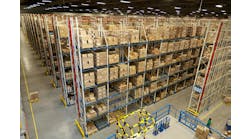This case history comes courtesy of Crown Equipment (New Bremen, Ohio). It has been selected and edited by the MHM editorial staff for clarity, content and style.
There are some things we all wish we could have 24 hours a day. Like a nice meal, or a quality TV program in the middle of the night. Much like the rest of the manufacturing world, Crown Equipment Corp. (New Bremen, Ohio) requires access to its inventory 24 hours a day, 7 days a week. But unlike its peers, Crown took the necessary steps to ensure its employees could access what they needed no matter what time it was.
There Must be a Better Way
It became apparent to Crown that there must be a better way to manage indirect materials than what was currently in place. Brenda Hughes, supervisor and buyer for Crown Equipment noted, "We really needed to get product to the operators on the machines. We felt our replenishment was effective, but unavailability for all three shifts was hurting production." Crown, being the forward-thinking organization that they are, began to look at RFID (radio fequency identification) to help with their indirect material challenges.
Being a manufacturer of lift trucks, RFID had certainly been on Crown's radar screen. The benefits to material handling and logistics operations have been becoming more and more obvious. But with the growing industry buzz around RFID, Crown began to investigate the possibility of expanding its RFID use to manage indirect materials and solving the challenge of providing 24-hour access.
Conceptually, Crown believed with RFID its employees could simply walk in a crib, pick up their supplies, and get back to work. Was this possible? Research uncovered the CribMaster Accu-Port, which is a commercial off the shelf (COTS) inventory management system geared specifically for managing indirect materials. CribMaster has partnered with Motorola to provide the antennae and readers to power the Accu-Port and have designed a plug-and-play portal specifically for managing indirect materials. The CribMaster system utilizes passive RFID technology and Gen2 passive tags.
This system offered Crown employees many benefits.
- Ability to access their tools at any time without staffing the crib.
- Reduction a 24-hour position to an hour and a half restocking job.
- The use of light-duty workers for restocking.
- Establishing organized delivery of items.
- Retaining an already effective replenishment method by integrating with its current system.
Even with all these advantages, the common issue of tagging small, expendable items with RFID was still on the table. It is hard to imagine attaching a tag to a screwdriver or drill bit, but with WinWare's (Marietta, Ga.) help, Crown discovered another way: tag the packaging , not the product.
Crown implemented a system where items are placed in bags with the corresponding label and RFID tag. A great advantage here is once workers take their item and walk out of the crib, they simply remove it from the bag, place the bag in a 'mailbox' and that packaging can be used again and again. This not only minimizes the cost of tags, but also limits the effort of restocking.
Crown's employees could now find items and even move the entire crib with ease. All items have been tagged and stocked according to a coordinate system. Then, if for any reason the crib needs to be moved, the walls can be taken apart, shrink-wrapped, and moved with all products still attached. The dismantling and reassembly can be completed in one day.
With tagging taken care of and the 'mailbox' system in place, restocking became easier than ever. At Crown, each crib monitors the movement of two to three hundred items each day. In crib 1, every one of these products is an expendable item, and therefore must be replaced. This process reduces restocking time and allows Crown employees to focus on other aspects of their indirect supply chain. With RFID the employee can simply refill the bags and take as many as 30 items back into the crib at a time. Here, all 30 are recorded and assigned to the tag instantly.
ROI - The Determining Factor of Success
In the end, having the CribMaster Accu-Port in just one area of its operation is benefiting Crown. ROI studies have proven a substantial impact, and this savings has allowed Crown to justify the system with reduced inventory usage alone. Using reportable purchasing information, Crown has acknowledged that since implementing the Accu-Port crib, their daily average inventory usage has been reduced by 21.65%. This has proven a return on investment of less than four months.
Other Soft Cost Reductions Acknowledged by Crown
The other reductions, not taken into consideration, are also substantial and can dramatically shorten the ROI even more.
- Labor Savings - the reduction of a 24-hour position to an hour and a half was a great reduction in labor cost.
- Walk Time - having a central crib reduced the employee's travel time.
- Improved Productivity and Less Down Time - with the easily accessible tools, Crown employees can now grab what they need and get back to work.
Continuous Improvement Initiatives
Some continuous improvement plans for Crown include expanding its RFID network. Brenda Hughes foresees nine to ten Accu-Ports across her facilities by 2010. This consolidation will give her the ability to use bulk buying incentives, while the mobility and easy "go-live" of the cribs will make this transition period run smoothly. RFID ended up being a no-brainer for Crown. It saved on tags and reduced restock time with the innovative identification scheme by tagging the packages. Its employees could maximize the system's potential with ease, but more importantly, it could finally reach the tools they needed around the clock.
MHMonline.com welcomes relevant, exclusive case histories that explain in specific detail the business benefits that new software and material-handling equipment has provided to specific users. Send submissions to Lisa Kempfer ([email protected]), MHM managing editor. All submissions will be edited for clarity, content and style.


